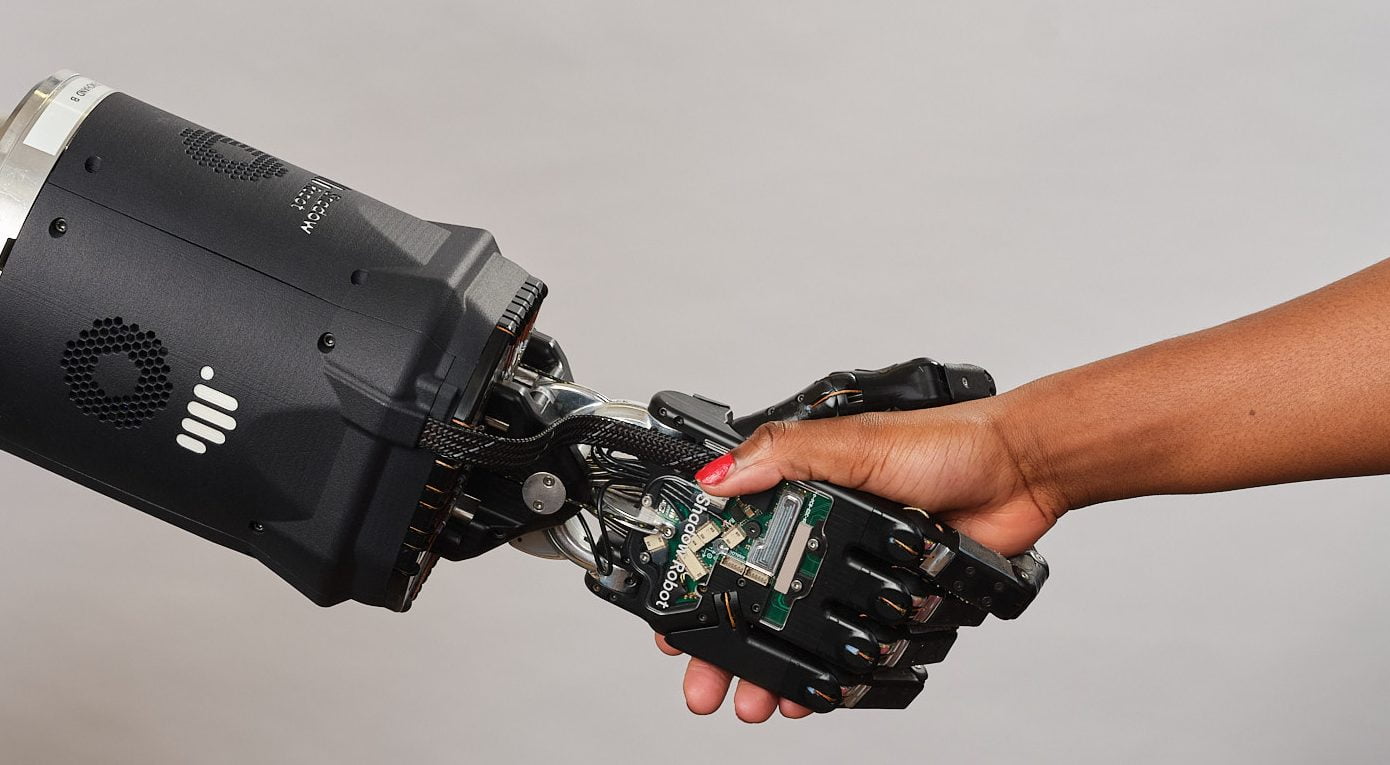The Future of Robotics and AI in Extreme Environments
Nov 27, 2021
Extreme environments are calling out for the instalment of robotics.
Deep mining, nuclear decommissioning and offshore energy require work that is often too dangerous or too difficult for people. Robots provide the solution.
Where there’s an economic need, there’s a place for robots.
But, what are the current challenges surrounding robotics? Will robots take our jobs? Innovate UK have released a new free podcast (available on Stitcher), discussing these issues and featuring Shadow Robot’s MD, Rich Walker. The essential podcast takes a closer look at the future of robotics and AI in extreme environments. As Shadow Robot’s hardware is increasingly being used as tool to help research and development in AI and machine learning, Rich talks about open innovation and the opportunities that these areas can bring.
Here’s a brief overview of the relevant and pressing issues tackled in the free podcast:
The Industries Which Need Robots
From cost-efficiency to productivity, there are many benefits to using robots.
Which industries would benefit most from the instalment of robotics and AI?
Mapping the Sea Bed
Mapping the sea bed benefits many industries, such as offshore wind. For example, before certain cables can be laid, unexploded ammunition dumped on the sea floor needs to be cleared.
As well as this, there’s a lot of the UK coast we still haven’t explored, such as canyons and coral reefs. A complete map of the sea bed would be beneficial to a number of industries, allowing us to fully explore our seas.
Deep Sea Operations
Diving to extreme depths is highly dangerous for humans, as the changes in pressure can be more challenging than those presented by travelling to space.
The use of robots would solve this, making deep sea operations safer and more efficient.
Radioactive Environments
Using robots in nuclear decommissioning would make the job safer and more efficient.
ROVs (Remotely Operated Vehicles) and robots are able to hold tools and perform dexterous tasks that would be otherwise impossible.
Surveying
Instead of using people to examine the characterisation of land, buildings and equipment, robots could be used.
This would prevent potential harm and increase productivity.
What are the Current Challenges?
So, if robots present so many solutions to current issues, why aren’t we using more of them?
Firstly, many industries cannot afford to install robotics. For example, the oceanography sector has to work with the fraction of the budget given to the space industry.
Despite advancements, many of the ROVs and robots deployed to certain industries are still relatively dumb. They require intelligent pilots to control them. Ideally, in the future, the technology will advance enough to give us intelligent vehicles instead.
As well as this, some of the extreme environments present too much of a challenge even for robots. Sometimes, in nuclear environments, ROVs stop working before they can complete their task, becoming radioactive waste themselves.
Also, our current vehicles are limited. From recurring power issues, such as short battery life, to communication problems, robotics must make vast improvements in order to meet the needs of extreme environments.
Does AI Provide the Solution?
We need to rethink the way we create our robots. When most people imagine robots, they conjure up an image of a humanoid machine. But, this isn’t actually the case.
Robots with artificial intelligence are the future.
If a robot could make its own decisions, it would be much more productive and able to find solutions to issues itself, without the need for human intervention. This efficiency will be invaluable to several industries.
In the future, autonomous vehicles will be able to carry out the underwater maintenance work needed for certain inspections, such as looking after our internet cables.
Open Innovation
The development of robotics will open up many exciting job opportunities for SMEs and innovators.
Shadow Robot’s MD Rich Walker discusses how collaboration is a huge part of building a business. The introduction of robots will create a value chain for SMEs to take advantage of.
Where there’s a problem, there’s someone passionate about this problem who’s working to fix it. This creates open innovation where businesses create products and then exchange systems.
Robots will be at the core of these mutually beneficial business partnerships. For example, for Rich Walker, artificial intelligence has proved invaluable when finding like-minded people to set up business relationships with.
Robots are changing the face of innovation, creating exciting job and business opportunities for SMEs and intrapreneurs.
Will Robots Take Our Jobs?
Despite the opportunity for business development, the question on many people’s minds is whether robots will replace us in the workplace.
The answer: yes and no.
While robots will replace people in dangerous or highly dexterous task, they will not make us redundant.
Robots will still need to be maintained, and sometimes controlled, by people.
Therefore, while robots may take some of the jobs we cannot perform, this will be balanced by the opportunities they create. Our workplaces will evolve to include robots.
These highly autonomous robots will help us to solve many of the big problems we’re currently facing.
Interested in finding out more? You can listen and download the full show on iTunes, Stitcher or Buzzsprout. Also, subscribe to Innovate UK’s YouTube channel for the latest information on innovation and scientific breakthroughs.

Many thanks to Innovate UK for providing us with this post.